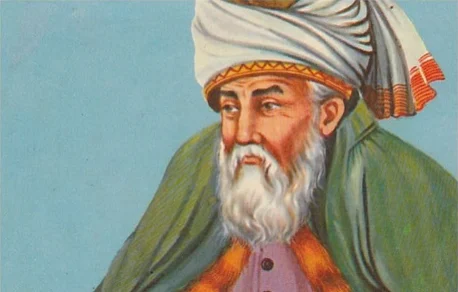More and more I hear Muslims bemoaning the fact that Islam has been taken out of Rumi. I share many of their sentiments. But, what is far more tragic, in my eyes, and which I don’t notice the same consternation for is that, as far as most of the Muslim community is concerned, Rumi has been taken out of Islam.
How many times have you heard Rumi mentioned from the pulpit at Friday prayer? How many times has the Masnavi been taught at your local mosque? How many Muslim conferences have centred, or even acknowledged, the poetry and philosophy of the world’s most influential mystical poet?
I am the first to acknowledge that the pop culture version of Rumi is superficial and stripped of its deeper symbolic potency by virtue of being divorced from its metaphysical context. But, I would encourage my brothers and sisters in Deen to consider another perspective through which to view this situation: that of divinely gifted opportunity.
The best-selling poet in America is our master Mawlana Rumi. He is beloved not only as a great poet but as one of the great spiritual teachers of human history. His words are everywhere we look. This is a great opportunity because it shows that while many of our fellow countrymen are unable to see the beauty, depth, and universal truth in our Deen, they have a great affinity for Sufism in general and Rumi in particular.
Colman Barks, (who was exposed to Rumi through his teacher Shaykh Bawa Muhiyadin) and other popularisers of Rumi, have done a great service to this Deen and may Allah reward them immensely. Sure, his versions are often 50% Rumi and 50% Barks (and it would do one well to keep that in mind when reading them), but he must be commended for rendering Mawlana’s timeless wisdom into beautiful and relevant contemporary post-Whitman American free verse. Anyone who has tried to translate anything, especially poetry, into another language knows how great of an accomplishment this is. That is not to say that I don’t personally have critique of some aspects of Barks’ versions, nor that anyone else should not; but it is to say that, with all its imperfections, he has done a great service to this Deen and to the English speaking world. We could simply complain that the bridge he has built is imperfect or we could express gratitude to God for giving us a head start and then get busy finishing the bridge!
Yes, often Barks’ downplays Islamic references in order to translate the meanings into references familiar to a general English-speaking audience who are unfamiliar with our tradition. To a greater or lesser extent, this is what all translators do when translating literature from one cultural context to the next.
For instance, one popular Barks’ version of Rumi is:
“There are a hundred ways to kneel and kiss the ground
Let the beauty we love be what we do.”
The literal and accurate translation of which is,
“There are a hundred ways of prayer, bowing and prostration [salat, ruku’, sajda]
For one who’s prayer-niche is the beauty of the Beloved.”
I actually find Barks’ version very beautiful and its meanings are definitely not incorrect, but for those who understand the references to the Muslim prayer, the Barks’ version sounds weak in comparison. Rumi is saying that, for those who truly follow the path of ecstatic love of Allah, every single thing they do is a prayer. To take it from its metaphysical context more or less takes the teeth out of the powerful bite of the poem.
Barks’, who does not speak Persian, works from Nicholson’s masterful translation of the Masnavi. Nicholson, who had a mastery of Persian and Arabic, dedicated over a decade of his life to pouring over old manuscripts to produce the first complete translation of the massive 25,000 line poem. In fact, the conditions of the manuscripts were so poor, and he worked so tirelessly that he literally went blind by the end of the process. This “orientalist” literally gave his eyes so that we could read Rumi in English. If we have any wisdom, we would be too consumed with gratitude for those who laid the groundwork to sit behind our computers and mention the popular versions with disdain.
Of course, it is clear to anyone who has spent some time diving into the work of Rumi that he would have a fairly strong critique of the “New Age Rumi” that has emerged in the popular culture. However, it becomes just as clear that he would have no less strong of a critique for what passes as “Islam” in most of our Muslim communities today.
Rumi is unwavering in his critique of those who are stuck on the surface of the religion. Those who relate to God legalistically or dogmatically (or as a matter of “identity”) are the recipients of his scorn and pity.
Rumi definitely saw himself as following in the footsteps of the Prophet Muhammad ﷺ and his righteous followers, but he considered those who had not understood the ecstatic experience of divine love as the core of the Deen as hopelessly lost and astray.
While popular versions of Rumi may paint his universalism as his departure from the religion of his birth. The truth of the matter is that his universalism is the result of his spiritual growth to embrace the deepest depths of Islam; not an abandonment of it.
Yet, the main recipient of Rumi’s ire in his works is the exoteric minded Muslim who denies the mystical knowledge of the Sufis. Who have taqlid (blind imitation) but not tahqiq (experiential knowledge/verification). Who have sharia but no haqiqa. Who don’t see that the true inheritors of the prophets are the awliya (Sufi masters) and not those who master the minutiae of canon law.
Those of our non-Muslim family members, neighbours and co-workers here in North America who seek an ecstatic experience of the divine presence, or who have had their own intimations of this expansiveness, or who seek a personal experience of the divine and not one dictated to them by a stifling hierarchy of men who claim to mediate between them and God are the ones who have fallen in love with Rumi in our lands. These are the ones who celebrate him, buy his works and spread them on social media.
Many of them, including myself, have eventually fallen in love with, and converted to Islam, because of Rumi. If it wasn’t for these popular versions opening the door we would likely have never seen the beauty of this Deen. Yet, when we sought out the local mosque, in search of people who practice Rumi’s Islam of love, non-judgement, ecstatic devotion to God, sacred expression of song, music and dance, we have been sadly underwhelmed with what we have found, if not altogether cast out and rejected.
It is pretty obvious that this would displease Rumi much more than the fact that some non-Muslims love his poetry and interpret it according to their understanding.
Yet it remains the fact that we cannot even mention Sufism in most Muslim spaces in North America and Europe. We must covertly speak euphemistically with terms such as “tazkiyya”. And we cannot mention the names of the great Sufis, such as Rumi, without being considered with deep suspicion by our co-religionists. So while it is indeed unfortunate that Islam has been taken out of Rumi, it is infinitely more tragic that Rumi has been taken out of Islam.
By Baraka Blue, a highly acclaimed rapper and poet hailing from Seattle and based in Oakland, California.
You can follow Baraka Blue on Instagram by clicking below:
View this post on Instagram
Baraka Blue teaches courses on Rumi and Sufi poetry at rumicenterworkshops.com.
Find out more at: BarakaBlue.com

















